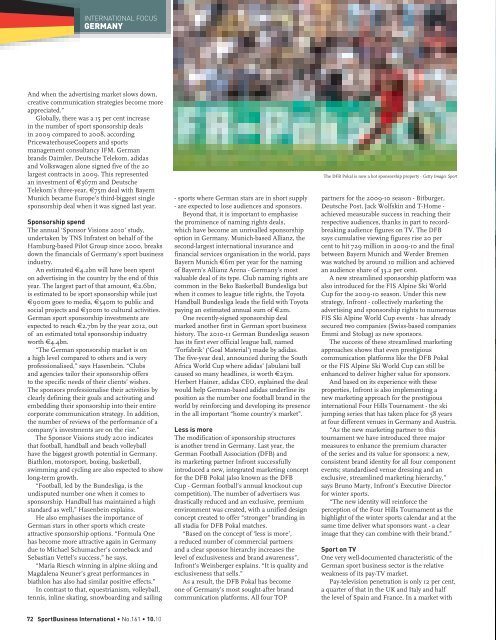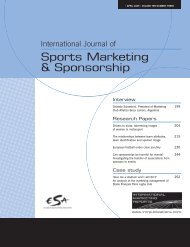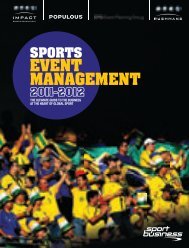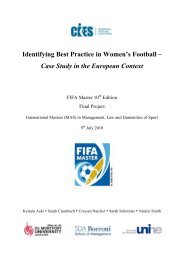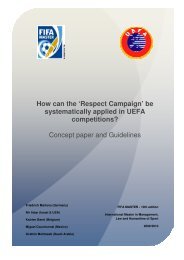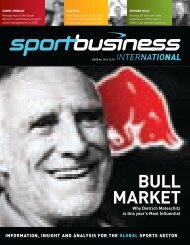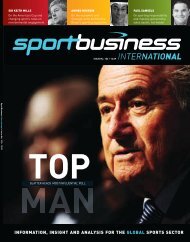information, insight and analysis for the global sports sector ...
information, insight and analysis for the global sports sector ...
information, insight and analysis for the global sports sector ...
You also want an ePaper? Increase the reach of your titles
YUMPU automatically turns print PDFs into web optimized ePapers that Google loves.
INTERNATIONAL FOCUSGERMANYAnd when <strong>the</strong> advertising market slows down,creative communication strategies become moreappreciated.”Globally, <strong>the</strong>re was a 15 per cent increasein <strong>the</strong> number of sport sponsorship dealsin 2009 compared to 2008, accordingPricewaterhouseCoopers <strong>and</strong> <strong>sports</strong>management consultancy IFM. Germanbr<strong>and</strong>s Daimler, Deutsche Telekom, adidas<strong>and</strong> Volkswagen alone signed five of <strong>the</strong> 20largest contracts in 2009. This representedan investment of €367m <strong>and</strong> DeutscheTelekom’s three-year, €75m deal with BayernMunich became Europe’s third-biggest singlesponsorship deal when it was signed last year.Sponsorship spendThe annual ‘Sponsor Visions 2010’ study,undertaken by TNS Infratest on behalf of <strong>the</strong>Hamburg-based Pilot Group since 2000, breaksdown <strong>the</strong> financials of Germany’s sport businessindustry.An estimated €4.2bn will have been spenton advertising in <strong>the</strong> country by <strong>the</strong> end of thisyear. The largest part of that amount, €2.6bn,is estimated to be sport sponsorship while just€900m goes to media, €340m to public <strong>and</strong>social projects <strong>and</strong> €300m to cultural activities.German sport sponsorship investments areexpected to reach €2.7bn by <strong>the</strong> year 2012, outof an estimated total sponsorship industryworth €4.4bn.“The German sponsorship market is ona high level compared to o<strong>the</strong>rs <strong>and</strong> is veryprofessionalised,” says Hasenbein. “Clubs<strong>and</strong> agencies tailor <strong>the</strong>ir sponsorship offersto <strong>the</strong> specific needs of <strong>the</strong>ir clients’ wishes.The sponsors professionalise <strong>the</strong>ir activities byclearly defining <strong>the</strong>ir goals <strong>and</strong> activating <strong>and</strong>embedding <strong>the</strong>ir sponsorship into <strong>the</strong>ir entirecorporate communication strategy. In addition,<strong>the</strong> number of reviews of <strong>the</strong> per<strong>for</strong>mance of acompany’s investments are on <strong>the</strong> rise.”The Sponsor Visions study 2010 indicatesthat football, h<strong>and</strong>ball <strong>and</strong> beach volleyballhave <strong>the</strong> biggest growth potential in Germany.Biathlon, motorsport, boxing, basketball,swimming <strong>and</strong> cycling are also expected to showlong-term growth.“Football, led by <strong>the</strong> Bundesliga, is <strong>the</strong>undisputed number one when it comes tosponsorship. H<strong>and</strong>ball has maintained a highst<strong>and</strong>ard as well,” Hasenbein explains.He also emphasises <strong>the</strong> importance ofGerman stars in o<strong>the</strong>r <strong>sports</strong> which createattractive sponsorship options. “Formula Onehas become more attractive again in Germanydue to Michael Schumacher’s comeback <strong>and</strong>Sebastian Vettel’s success,” he says.“Maria Riesch winning in alpine skiing <strong>and</strong>Magdalena Neuner’s great per<strong>for</strong>mances inbiathlon has also had similar positive effects.”In contrast to that, equestrianism, volleyball,tennis, inline skating, snowboarding <strong>and</strong> sailing- <strong>sports</strong> where German stars are in short supply- are expected to lose audiences <strong>and</strong> sponsors.Beyond that, it is important to emphasise<strong>the</strong> prominence of naming rights deals,which have become an unrivalled sponsorshipoption in Germany. Munich-based Allianz, <strong>the</strong>second-largest international insurance <strong>and</strong>financial services organisation in <strong>the</strong> world, paysBayern Munich €6m per year <strong>for</strong> <strong>the</strong> namingof Bayern’s Allianz Arena - Germany’s mostvaluable deal of its type. Club naming rights arecommon in <strong>the</strong> Beko Basketball Bundesliga butwhen it comes to league title rights, <strong>the</strong> ToyotaH<strong>and</strong>ball Bundesliga leads <strong>the</strong> field with Toyotapaying an estimated annual sum of €2m.One recently-signed sponsorship dealmarked ano<strong>the</strong>r first in German sport businesshistory. The 2010-11 German Bundesliga seasonhas its first ever official league ball, named‘Torfabrik’ (‘Goal Material’) made by adidas.The five-year deal, announced during <strong>the</strong> SouthAfrica World Cup where adidas’ Jabulani ballcaused so many headlines, is worth €25m.Herbert Hainer, adidas CEO, explained <strong>the</strong> dealwould help German-based adidas underline itsposition as <strong>the</strong> number one football br<strong>and</strong> in <strong>the</strong>world by rein<strong>for</strong>cing <strong>and</strong> developing its presencein <strong>the</strong> all important “home country’s market”.Less is moreThe modification of sponsorship structuresis ano<strong>the</strong>r trend in Germany. Last year, <strong>the</strong>German Football Association (DFB) <strong>and</strong>its marketing partner Infront successfullyintroduced a new, integrated marketing concept<strong>for</strong> <strong>the</strong> DFB Pokal (also known as <strong>the</strong> DFBCup - German football’s annual knockout cupcompetition). The number of advertisers wasdrastically reduced <strong>and</strong> an exclusive, premiumenvironment was created, with a unified designconcept created to offer “stronger” br<strong>and</strong>ing inall stadia <strong>for</strong> DFB Pokal matches.“Based on <strong>the</strong> concept of ‘less is more’,a reduced number of commercial partners<strong>and</strong> a clear sponsor hierarchy increases <strong>the</strong>level of exclusiveness <strong>and</strong> br<strong>and</strong> awareness”,Infront’s Weinberger explains. “It is quality <strong>and</strong>exclusiveness that sells.”As a result, <strong>the</strong> DFB Pokal has becomeone of Germany’s most sought-after br<strong>and</strong>communication plat<strong>for</strong>ms. All four TOPThe DFB Pokal is now a hot sponsorship property - Getty Images Sportpartners <strong>for</strong> <strong>the</strong> 2009-10 season - Bitburger,Deutsche Post, Jack Wolfskin <strong>and</strong> T-Home -achieved measurable success in reaching <strong>the</strong>irrespective audiences, thanks in part to recordbreakingaudience figures on TV. The DFBsays cumulative viewing figures rise 20 percent to hit 729 million in 2009-10 <strong>and</strong> <strong>the</strong> finalbetween Bayern Munich <strong>and</strong> Werder Bremenwas watched by around 10 million <strong>and</strong> achievedan audience share of 33.2 per cent.A new streamlined sponsorship plat<strong>for</strong>m wasalso introduced <strong>for</strong> <strong>the</strong> FIS Alpine Ski WorldCup <strong>for</strong> <strong>the</strong> 2009-10 season. Under this newstrategy, Infront - collectively marketing <strong>the</strong>advertising <strong>and</strong> sponsorship rights to numerousFIS Ski Alpine World Cup events - has alreadysecured two companies (Swiss-based companiesEmmi <strong>and</strong> Stobag) as new sponsors.The success of <strong>the</strong>se streamlined marketingapproaches shows that even prestigiouscommunication plat<strong>for</strong>ms like <strong>the</strong> DFB Pokalor <strong>the</strong> FIS Alpine Ski World Cup can still beenhanced to deliver higher value <strong>for</strong> sponsors.And based on its experience with <strong>the</strong>seproperties, Infront is also implementing anew marketing approach <strong>for</strong> <strong>the</strong> prestigiousinternational Four Hills Tournament - <strong>the</strong> skijumping series that has taken place <strong>for</strong> 58 yearsat four different venues in Germany <strong>and</strong> Austria.“As <strong>the</strong> new marketing partner to thistournament we have introduced three majormeasures to enhance <strong>the</strong> premium characterof <strong>the</strong> series <strong>and</strong> its value <strong>for</strong> sponsors: a new,consistent br<strong>and</strong> identity <strong>for</strong> all four componentevents; st<strong>and</strong>ardised venue dressing <strong>and</strong> anexclusive, streamlined marketing hierarchy,”says Bruno Marty, Infront’s Executive Director<strong>for</strong> winter <strong>sports</strong>.“The new identity will rein<strong>for</strong>ce <strong>the</strong>perception of <strong>the</strong> Four Hills Tournament as <strong>the</strong>highlight of <strong>the</strong> winter <strong>sports</strong> calendar <strong>and</strong> at <strong>the</strong>same time deliver what sponsors want - a clearimage that <strong>the</strong>y can combine with <strong>the</strong>ir br<strong>and</strong>.”Sport on TVOne very well-documented characteristic of <strong>the</strong>German sport business <strong>sector</strong> is <strong>the</strong> relativeweakness of its pay-TV market.Pay-television penetration is only 12 per cent,a quarter of that in <strong>the</strong> UK <strong>and</strong> Italy <strong>and</strong> half<strong>the</strong> level of Spain <strong>and</strong> France. In a market with72 SportBusiness International • No.161 • 10.10


